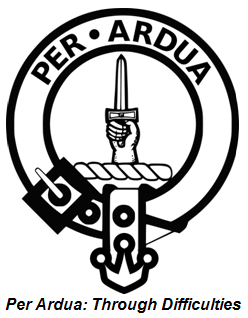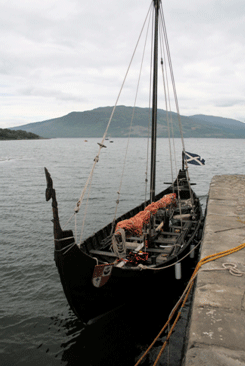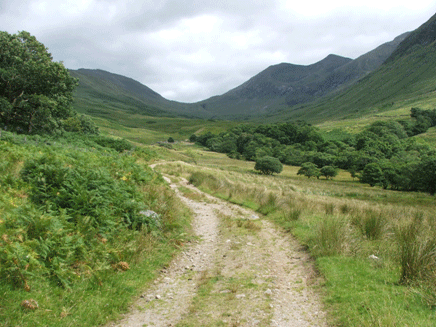MacIntyre

-
Clan Territory:
Glen Noe on the shores of Loch Etive, Argyll; also the district of Lorn, Argyll. -
Clan Chief:
For centuries, the chiefs of the MacIntyre clan have been after the lands they once occupied: Glenoe. The present chief is Donald Russell MacIntyre, 10th Chief of Glenoe, and citizen of the USA and a resident of California.

Arms of the MacIntyre Chief -
Clan Tartan:
-

MacIntyre Tartan -
Clan History:
-
The MacIntyre clan have long been associated with myth and legend. As one of the oldest of all Scottish clans, layers of history obscure their origins. Historians dispute the original homeland of the clan – some favouring the Island of Sky, while others believe that the MacIntyres came from Islay before they settled in the lands of Glen Noe in Argyllshire.

In Gaelic, the name MacIntyre means son of the carpenter, or wright. According to legend, the clan were named after an event that occurred in the early twelfth century, when Somerled Lord of the Isles sought the hand of Ragnhild – the daughter of the Viking King of Mann, Olaf the Red. At first, King Olaf refused to agree to the match, but a nephew of Somerled, called Macarill, assured his uncle that he could devise a scheme to win the bride.
It is said that Macarill sabotaged Olav’s galley by boring holes in the hull, which he then plugged with wax. He contrived to be a passenger on the king’s galley, and went well supplied with wooden plugs. Heavy seas washed out the wax and the galley began to founder, at which point Macarill promised to save the king’s life - if he would promise his daughter’s hand to Somerled. The pact was sealed, and the plugs used to stop the leaks. Macarill was thereafter known as the ‘wright’ or ‘carpenter’, and found high favour with his uncle.
Macarill’s descendants later established themselves on the mainland where, according to legend, they were warned by a spirit only to settle where a white cow in their herd came to rest. The land they settled was the rich and fertile Glen Noe by Ben Cruachan on Loch Etiveside. By the end of the thirteenth century the Macintyres were foresters to the Lord of Lorn, an office they held through the passing of the lordship from the MacDougall clan to the Stewarts and finally the Clan Campbell.

Looking up Glen NoeThe MacIntyre clan held the lands of Glen Noe by the sword, but eventually they became tenants of the neighbouring mighty Clan Campbell. According to tradition, the rent payable to the Campbell chiefs was a fatted calf at Christmas and a midsummer snowball from the high corries of Ben Cruachan, an impressive mountain bordering MacIntyre land that also gave the clan its battle cry, “Cruachan!”
At some unknown date the symbolic payment of a snowball and a calf were commuted to payment of money rent, which increased over the years. In 1806, the chief was forced to relinquish the tenancy of Glen Noe due to inability to meet the payments owed to the Campbells of Breadalbane. The chief and his family emigrated to the United States, where the family continues to reside. Although interested clan members always knew the identities of the chiefs, the chief-ship of the clan was not officially recognized by Scottish authorities until 1991, when the Lord Lyon, King of Arms, confirmed the coat of arms of James Wallace MacIntyre of Glenoe.
Today, the lands of Glen Noe are utterly deserted. There are no roads into the region and access is difficult, requiring a boat across Loch Etive and a long hike along an unmade track into the heart of old MacIntyre country, where deer now roam over fields once grazed by the clan’s white cattle.
The Galloglas DVD, MacIntyre is not yet available; if you would like to be informed of the release date please email alexandria@greatscottishclans.com.
-
Famous MacIntyres:
The poet Duncan Ban MacIntyre: known to his countrymen as “Fair Duncan of the Songs.” One historian has described him as one of the twin peaks of the 18th century's Gaelic verse". Others have called him the Robert Burns of the Highlands.
Michael MacIntyre, British comedian.
Alasdair Chalmers MacIntyre, the Glasgow born philosopher.
-
And Finally:
Although legend has it that the MacIntye names links the clan to the skill of joinery, it was by another trade that many clan members made a living. Cladich, a small village or clachan above Loch Awe was a centre of weaving, and almost all of the inhabitants were MacIntyres. A specialty of the industry were men's hose and garters.